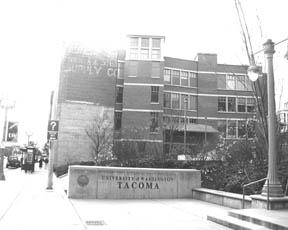Economic issues were addressed from two very different angles during Tuesdays City Council study session.
The Pierce County Coordinating Council, represented by the five local technical and community college presidents, updated the council on collaborative economic developments, as well as current issues facing the colleges.
Recommendations were also made to the City Council regarding 2003-2004 mid-biennium budget adjustments.
COLLEGE UPDATE
We may be setting a record for college presidents in one room, remarked Mayor Bill Baarsma at the start of the study sessions first agenda item.
On hand were Bill Roden, Bates Technical College president; Councilwoman Sharon McGavick, Clover Park Technical College president; Steve Wall, Pierce College District President; Michele Johnson, Pierce College Lakewood president; and Pamela Transue, Tacoma Community College president.
Were here today to talk about how we work together, McGavick said, referring to schools partnering with each other, local government and private organizations.
We obviously dont do what we do alone, Wall noted.
He highlighted such partnerships as the Pierce County Careers Connection, a program which has become a national model; Tacoma Community Colleges work with area hospitals; and the nursing program that is being started at Pierce College.
Those partnerships appear to be paying economic dividends, according to statistics presented by Transue:
– An 18.4 percent return on taxpayers investments;
– A 19.7 percent return on investments for students;
– $20.6 million in yearly savings in social costs; and
– $621.9 million in yearly county income, representing 5 percent of the total income in the county.
Also on the minds of the assembled college presidents was recent talk of turning the University of Washington Tacoma into a four-year school.
Johnson called this a troubling development, not because of concerns about competition, but because place-bound students are prominent in Tacoma.
We feel we will lose transfer access for our students, Johnson said, noting UW Tacoma is the No. 1 choice for area transfer students because of its convenient location and relatively low cost.
Were really concerned about this, she said. What were all about in higher education is access.
MID-BIENNIUM BUDGET ADJUSTMENTS
Tacoma City Council members discussed closing next years $12.3 million budget gap during city budget director Diane Suplers presentation of midterm plans for the citys two-year, $341 million operating budget.
Grappling with difficult budget realities such as the voter approved Initiative 776 that eliminated vehicle license fees and legal expenses related to the Brame case that have reduced the amount of money available to spend, sometimes frustrated council members sought to find ways to dig the city out of the $12.3 million hole.
Plans for trimming the gap include:
– Shifting some expenses to next year or 2005, whittling the shortfall down to about $4 million;
– The $6.5 million cost of the Thea Foss Waterway cleanup shrunk to $100,000 after the city won a grant to pay for the majority of it; and
– Higher-than-expected income in the general fund ($1.3 million), unspent money from various departments ($1.9 million) and transfers from funds to various funds into the general fund ($613,000) took care of the rest of the shortfall.
The City Council was generally supportive of the short-term budget fixes, recognizing that such fixes wont be available next year when the council takes on the task of the 2005-2006 budget, at which time the city is expected to face a $24 million to $30 million gap.
Councilman Kevin Phelps said its better to make tough decisions now, rather than postpone them, making them even more difficult.
I think we need to be smarter about how we manage our resources, said City Manger Jim Walton.
A final reading of the mid-biennium modification ordinance is set for Tuesday, Dec. 16.





